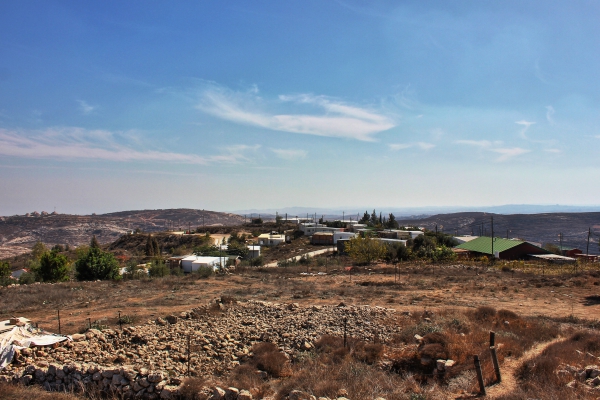Next to Route 60, a road that crosses the length of the West Bank, to the northeast of Ramallah lies the Israeli settlement of Ofra. If you go through this place peopled by some 3,000 inhabitants, a ribbon of tarmac climbs up a nearby hill. From there you have a spectacular view of the surrounding countryside. It is there that a group of radical young Israelis who say they want to “live in a community on our Biblical land”, settled in 1996. This is the outpost of Amona, which now has 40 families living there. It is the biggest “outpost” (unauthorized settlement) in the West Bank and is now at the heart of a battle between the Israeli judicial authorities, the government and the Palestinian owners of the land.
Eli Grinberg, a father of eight, has been living in Amona for 13 years. “When we came here, there was nobody,” he says. “If you look at the mountains around, they are bare. It was the same then.”
Except that this land is owned by people living in the nearby Palestinian villages of Silwad, Ein Yabroud and Taybeh. One of them is Ibrahim Yacoub, whose title to part of this land is registered in both Jordan and Israel. “That land was the main source of income for my family” he recounts. “There is a well, and we brought our animals to pasture here, we grew wheat and animal fodder.
Outpost
Whilst all Israeli settlements in the West Bank (occupied Palestinian territories) are illegal under international law – the Fourth Geneva Convention says that “an occupier may not forcibly deport protected persons, or deport or transfer parts of its own civilian population into occupied territory” (Art.49) --, Israeli law only accepts legal complaints regarding settlements on private Palestinian land, i.e. when land owners can prove that their title is registered in Jordan, which held the territory from 1948 to 1967. An Israeli Supreme Court order for the evacuation of Amona has pushed the ultra-religious Jewish Home, one of the parties in the government coalition, to put this principle into question. To stop the evacuation of Amona, it has introduced a Bill being discussed in the Knesset (Israeli parliament) which would, if passed, “legalize” outposts constructed on private Palestinian land in return for financial compensation to the title holders.
In Amona, the case has always been clear for the Israeli army, as for the Israeli courts: this outpost was built on private land. But whereas the Civil Administration, the branch of the army responsible for managing the Occupied Territories, had called on the inhabitants of Amona to leave, government ministries have several times provided financial support to this outpost. “On the one hand the government, or more precisely the Ministry of Housing, has given money,” explains Gilad Grossman, spokesman for Israeli human rights organization Yesh Din. “On the other hand, right from the start, the Civil Administration has ordered the people of Amona to leave, and the police have stopped construction of a road leading to it, because it wasn’t legal. The army has also refused a security point to protect the inhabitants.”
Supreme Court
Back in Amona, the inhabitants stress the ambivalence. “You see, you arrived here by road, we have electricity and water pipes,” says Nahum Schwarty, who grew up in Ofra before moving to Amona, where he lives with his wife and their six children. “I can tell you, Ariel Sharon once came here. And he said to us: `You are lazy! You are not building fast enough, you need to get to work`.”
A first demolition order was issued as early as 2000. In 2005, Israeli organization Peace Now filed a petition to the Israeli Supreme Court demanding the demolition of nine residential structures in Amona. It won the case, and in February 2006 the government of Ehud Olmert, with Shaul Mofaz as Defence Minister, sent the police to destroy the buildings. But the security forces on the ground were met by a large number of demonstrators, and the clashes were violent.
Two years later, Yesh Din also went to the Supreme Court on behalf of a group of Palestinian land owners. This time it called for the evacuation of the whole outpost. And once again, the Supreme Court ruled in its favour. The State also recognized that the outpost was illegal, but asked the Court to suspend the evacuation deadline, which was first set for April 2013. The evacuation deadline has been pushed back several times at the request of the government, under pressure from the inhabitants of Amona and their allies in the ultra-nationalist Right. A last deadline was finally decided: December 25, 2016. A final appeals decision was rejected by the Supreme Court in November.
A new law?
To circumvent the judges’ decision, Jewish Home has decided to introduce a so-called “regulatory” law which would allow the State to confiscate private land and legalize outposts retroactively. The party, led by Education Minister Naftali Bennett, is now in open conflict with the Supreme Court. Not a day goes by when a member of this party, including Justice Minister Ayelet Shaked, does not slam the judges whose decisions they say are “anti-democratic”. “What the Left did not win through the ballot box they are trying to win through the courts,” is their preferred mantra.
Prime Minister Benjamin Netanyahou, who at first backed the Bill when it was approved by the ministerial law commission, now says that this legislation could bring Israelis before the International Criminal Court. Last week, during a tumultuous cabinet meeting, Netanyahou warned that “if this law is passed, it could take us to The Hague”.
Daily negotiations on the fate of Amona no longer concern just the future of the government coalition, under pressure from Bennett’s constant attacks on Netanyahou, but also the credibility of the Supreme Court.






